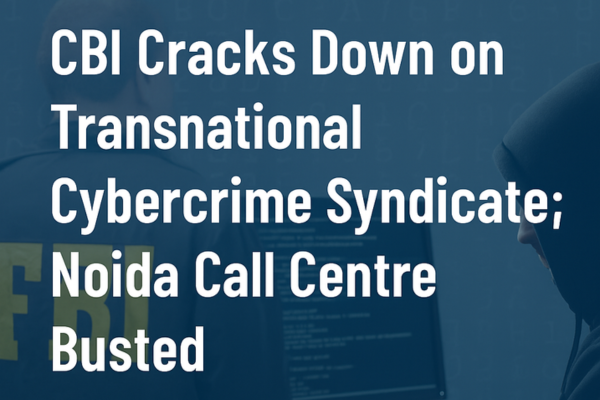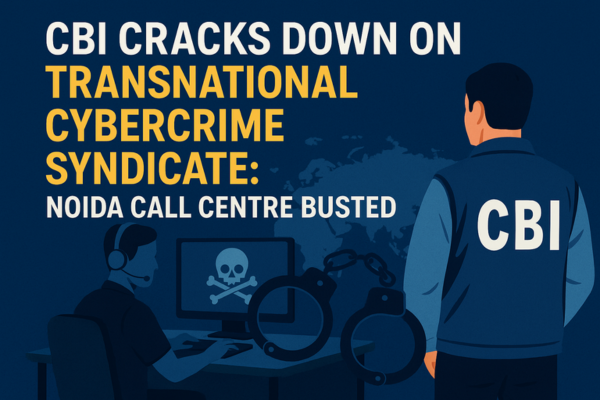🕵️♂️ Introduction
In a significant breakthrough against international cybercrime, the Central Bureau of Investigation (CBI) in collaboration with the FBI (United States) and UK police has busted a fake call center in Noida involved in a global scam targeting foreign nationals. This joint operation highlights the growing sophistication of cyber fraud networks operating from Indian soil and the need for international cooperation to curb them. As part of this ongoing effort, the CBI Cracks Down on such fraudulent activities. It is imperative that we recognize how crucial the CBI Cracks Down on cybercrime.
This blog post covers the full story of the CBI cybercrime raid in Noida, how the call center operated, who was targeted, and what it means for India’s fight against online crime.
Furthermore, the CBI Cracks Down on these operations to safeguard the public and ensure justice for victims of cyber fraud.
This ongoing emphasis on how the CBI Cracks Down shows the increasing determination of the agency to combat cyber threats effectively.
This operation is a clear indication that the CBI Cracks Down on cybercrime with increasing intensity.
Table of Contents
📍 Background: The Rise of Cybercrime in India
The CBI Cracks Down on these illegal operations with the goal of dismantling their networks and preventing further scams.
India is rapidly becoming a hotbed for cybercrime operations, especially with the proliferation of cheap internet, increased digital payments, and lack of awareness among users. Many fake call centers pose as tech support agents or government officials, scamming thousands of dollars from unsuspecting foreign nationals.
According to the National Crime Records Bureau (NCRB), cybercrime cases in India have increased by over 250% in the last five years. Noida, Delhi NCR, and parts of Gurugram and Jharkhand are infamous for hosting such fraudulent hubs. These regions offer the perfect mix of infrastructure, skilled youth, and weak regulation enforcement, which make it easier for such operations to thrive under the radar.
🚨 The Big Bust: What Happened in Noida?
On July 7, 2025, the CBI conducted a high-profile raid on a commercial building in Sector 63, Noida, where a sophisticated fake call center had been operating for months. Here are the key highlights:
- Operation Name: Not officially disclosed but internally termed “Project Black Web” by investigators.
- Agencies Involved: CBI (India), FBI (USA), and UK Cyber Crime Unit.
- Arrests Made: 6 key accused detained, including the mastermind and IT handlers.
- Employees Detained: Over 30 young individuals working as “tech support agents.”
- Equipment Seized: 60+ computers, 80 mobile phones, VoIP systems, crypto wallets, and forged ID cards.
💻 How the Scam Worked

The syndicate was running an impersonation scam, primarily targeting elderly citizens in the US, UK, and Australia. Here’s the step-by-step breakdown of their modus operandi:
Initial Contact:
Victims received a fake pop-up on their computers saying their system had been “compromised by hackers.”
As the CBI Cracks Down, it’s clear that these crooks will face increasing challenges in executing their scams.
Fake Helpline:
They were urged to call a tech support number that connected them to the Noida-based call center.
Remote Access:
The agents convinced victims to download remote access software like AnyDesk or TeamViewer.
Fear Tactics:
Victims were told their bank accounts were at risk and to move money into “safe government accounts.”
Fraudulent Transactions:
Victims unknowingly transferred funds to crypto wallets or overseas accounts managed by the fraud ring.
🌍 International Reach
This wasn’t a small scam.
- Victims spanned three continents.
- Losses reported by the FBI exceed USD 12 million.
- The UK Cyber Crime Unit traced complaints from over 1,000 victims in the last 12 months.
- Funds were being laundered through cryptocurrencies and digital wallets.
This operation has been under surveillance for over 8 months, and both Indian and foreign agencies had been tracking the IP addresses and digital trails left behind. Intelligence-sharing platforms and real-time communication were instrumental in synchronizing the raid across countries.
🧠 The Mastermind Behind It
The accused mastermind, Rohit Tiwari, a 32-year-old engineering graduate from Uttar Pradesh, is alleged to have previous links to phishing scams and cryptocurrency fraud. He had:
- Developed custom scripts for spoofing caller ID systems
- Created fake US-based caller numbers
- Employed English-speaking youth trained to mimic American accents
He paid his employees salaries ranging from ₹20,000 to ₹40,000 per month, offering lucrative incentives for successful scams. Rohit, who once worked in a BPO, used his experience to replicate genuine customer support environments, making it harder for victims to suspect fraud.
🧾 Legal Charges & IPC Sections Applied
The ramifications of the CBI Cracks Down extend beyond just arrests; they send a message to would-be scammers everywhere.
The suspects have been booked under multiple sections:
- Section 420 – Cheating
- Section 468/471 – Forgery and use of forged documents
- Information Technology Act, 2000 – Unauthorized access, identity theft
- Prevention of Money Laundering Act (PMLA) – For crypto laundering
CBI sources say this is just the tip of the iceberg. Legal experts suggest that international extradition treaties and treaties under Mutual Legal Assistance Treaty (MLAT) are also being leveraged for deeper investigation into international financial trails.
🧠 Cybersecurity Experts Speak
Cybersecurity expert Rajiv Prakash, commenting on this development, said:
“We are seeing a new form of digital colonialism—where cybercriminals operate globally while being physically untraceable without joint intelligence operations. This Noida raid proves the need for a cyber joint-task force at the international level.”
Dr. Neha Mehta, a legal expert in data protection, added:
“This incident proves that India needs a stronger Data Privacy Law and faster adjudication in cybercrime cases. We’re losing trust in our digital ecosystem.”
Public Reaction and Social Media Buzz
News of the raid went viral across Indian social media platforms. #NoidaRaid and #CBIStrike trended on X (formerly Twitter), with citizens applauding the CBI and demanding stricter monitoring of urban call centers.
Several influencers shared tips on cyber hygiene, and some even posted video reactions from relatives who had nearly fallen for similar scams in the past.
Policy Implications and Future Outlook
The Indian government has been working on the Digital India Act, which is expected to replace the outdated IT Act of 2000. The Noida call center case will likely push lawmakers to:
- Mandate registration of all call centers
- Implement tighter Know Your Customer (KYC) norms for VoIP users
- Require ISPs to report suspicious activities
CBI officials have stated that this is only the beginning. Follow-up raids in other parts of Delhi-NCR and Jharkhand are underway.
Steps You Can Take to Stay Safe
To protect yourself and your loved ones from cyber scams, here are a few practical tips:
- Never trust pop-up warnings – Real government or tech companies don’t use pop-ups.
- Never give remote access – Don’t install software at someone else’s direction.
- Verify unknown numbers – Always double-check before speaking to “officials.”
- Use a good antivirus – Keep your systems protected and updated.
- Educate seniors – They are the most vulnerable group.
⚠️ What This Means for India?
While this successful raid is commendable, it exposes certain harsh realities:
- India still lacks a dedicated centralized cybercrime response agency.
- There is no national registry to track call centers and their activity.
- Youth unemployment and easy access to VoIP systems have created a fertile ground for such scams.
On the bright side, India’s CBI and cybercrime cells are becoming more agile and internationally connected, which is crucial for the future.
✅ Steps You Can Take to Stay Safe
To protect yourself and your loved ones from cyber scams, here are a few practical tips:
- Never trust pop-up warnings – Real government or tech companies don’t use pop-ups.
- Never give remote access – Don’t install software at someone else’s direction.
- Verify unknown numbers – Always double-check before speaking to “officials.”
- Use a good antivirus – Keep your systems protected and updated.
- Educate seniors – They are the most vulnerable group.
✍️ Conclusion
The recent CBI crackdown on a fake Noida call center highlights both the sophistication and scale of cybercrime networks operating in India today. It also sends a strong message: India is ready to tackle cross-border cybercrime with full force and global cooperation.
As digital scams evolve, so must our awareness and law enforcement capabilities. Stay alert, stay informed—and continue following Current Pulse Jay for real-time updates on national affairs.
As the CBI Cracks Down on criminal elements, the public can feel more secure about their online interactions.
The CBI Cracks Down is not just a response; it is a proactive measure to prevent future scams from occurring.
As this trend continues, the CBI Cracks Down will hopefully lead to more stringent regulations and enforcement across the board.In the face of such challenges, the CBI Cracks Down indicates a robust strategy to safeguard citizens.
As a result, the public is witnessing how the CBI Cracks Down on these operations to protect internet users.
The CBI Cracks Down campaign illustrates the agency’s commitment to combating cybercrime efficiently.
In addition, the CBI Cracks Down showcases the importance of public awareness in fighting cybercrime.
The CBI Cracks Down on these frauds, we are reminded of the need for vigilance and education.
Ultimately, the CBI Cracks Down signifies a turning point in the fight against cybercrime in India.
In conclusion, with the CBI Cracks Down on these operations, there is hope for a more secure digital environment.
In light of this, it is essential to recognize how the CBI Cracks Down on cybercrime as a proactive and necessary measure.

